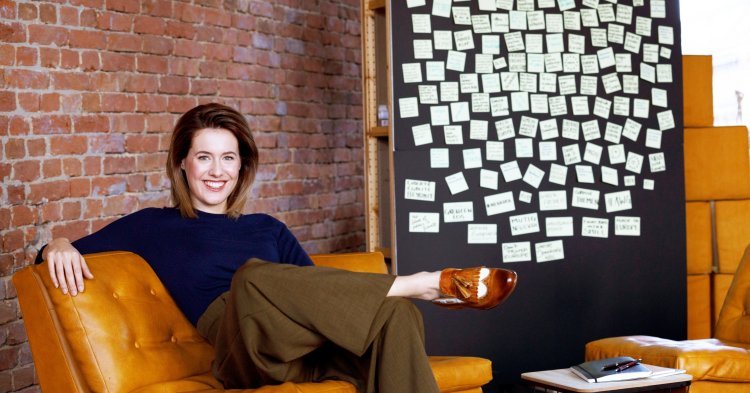TNF: NEOS is campaigning for the “United States of Europe”. Could you briefly outline this idea?
Claudia: The United States of Europe is a long-term vision – although there are certainly steps we would like to already realise at an earlier stage. In general, the term describes our conception of a European federal state with stronger European competency in essential areas, for example in defence policy, science and research, or – most crucially – European democracy.
How would you describe the political situation in Austria and how do you stand your ground as a small opposition party?
Austria has historically been rather Eurosceptic, but I dare to say that this is also a generational question and that young people are significantly more pro-European. However, to a certain extent, disenchantment with the EU is not entirely unjustified, given that the way it currently functions entails preprogrammed frustration. With the principle of unanimity, for instance, the EU will never be able to introduce a digital tax. There will always be at least two countries that will block, and that’s where I do understand citizens who say there’s something wrong if we can’t make progress on the pressing issues. We need to make Europe truly capable of acting and delivering.
Your answer to Eurosceptics would be the flight forward, a radical reform of the EU and its institutions, one of the key demands being – as you just implied – the abolition of the unanimity rule. Are there areas in which we should keep this principle?
I could see it staying in one area: the accession of new Member States.
How about treaty reform, which – just like accession to and withdrawal from the Union – is a quasi-constitutional matter?
Ahead of the next treaty revision, I would actually prefer convoking a constitutional convention, so that we can finally create a real European Constitution. In this respect, I want to highlight that most constitutions are actually passed and reformed by a two-thirds majority.
Speaking of withdrawal, what is your take on the recent Brexit developments?
Especially concerning Brexit, the EU should clearly state that its patience is running out. One of the reasons why all of this takes so long and has paralysed the Union for almost 3 years now is because the UK government cannot decide what it wants. At some point, we need to put an end to this uncertainty which causes economic damage for everyone and keeps us from tackling other important issues.
One issue having gained quite some attraction recently was the idea of a European army. You support this call although Austria is a constitutionally neutral country. How do people react to this demand?
I have to say that I am fairly surprised how well it catches on, I was expecting to do a lot more persuading. But to many people, this step just makes sense. We all have a great need for safety, we all want to safeguard our European freedoms and our democracy. We want to be sure that Europe’s best heads are working to protect our Union.
How do you see future relationships between Europe and other global powers?
I envisage a confident EU. Europe needs to have a strong voice on the international stage. In this regard, the unanimity principle is a hindrance. I also believe Europe should not keep quiet for a good trade deal and rather stand up for its values.
In the light of current American politics, Europe should be a strong defender of free trade and multilateralism. Concerning China, we should be a strong voice against the totalitarian surveillance state and other human rights violations. With regard to Russia, we need to fend off any interference with our elections and stand up to breaches of international law – which may not occur on EU territory but nonetheless on European soil.
Would this more confident Europe you are envisioning have tax competency as well?
Definitely. Though this should not be an ’either/or’ question. We believe the EU should collect taxes itself wherever it makes sense, also in order to create true own resources other than from customs revenue. Apart from that, the EU should exert a coordinative role, regarding a digital tax or a Europe-wide CO2 tax for example. Member States should continue to shape their own tax policy, which is also an important aspect in terms of competitiveness.
On this point you differ a little from your German sister party FDP. In general, there have been certain issues recently where the European Parliament’s liberal ALDE group did not take a coherent line. What’s your view on the infamous “Article 13” debate, for instance?
I am vehemently against it. Of course, copyright laws need to be updated to fit the 21st century, but the path via upload filters is one which installs an infrastructure of censorship in Europe and simply represents a misbalanced weighing of interests: individual freedom on the Internet must be our priority. Maintaining the existing “notice-and-take-down” system would have sufficed, given that the other points of the reform will already bring about important improvements. For me, this was just a clear sign that the European Parliament is full of people who have no clue about the Internet.
The other controversial topic for liberals is climate change. How do you see the Fridays for Future marches?
I think it’s great. Not only our chairwoman, who was actually on parental leave, but also a lot of other party members joined from the very beginning. Why else would you take to the street if not to stop the end of the world?
Let’s keep talking about ALDE. How do you feel about Team Europe and that no single Spitzenkandidat has been nominated?
In the end, it is absolutely okay how ALDE decided to go forward. Let’s not fool ourselves: The Spitzenkandidaten system is just a show that mainly benefits the EPP. When they in the end decide to put forward another candidate in the European Council, we will have to live with that as well. The only consequent solution would be to abolish this charade and introduce the direct election of the Commission President.
JEF, on the contrary, favours a parliamentarian system. What is your argument for a direct election?
I simply deem it an important symbol. We need to strengthen the European public and a direct election would create stronger identification with EU politics.
Basically, to have a choice between this or that person, this or that face, this or that set of policy priorities?
Yes, and ideally, it will not be some apparatchik free of any charisma.
Is Team Europe present in your campaign?
We had Transport Commissioner Violeta Bulc and Momentum co-founder Katalin Cseh at our official campaign kickoff. That was actually pretty cool and people really enjoyed the possibility to get to know allies from other EU countries and to see that we, as liberal party family, run a Europe-wide campaign.
Have you been campaigning outside of Austria as well?
We have indeed crossed our national borders: We visited Progressive Slovakia in Bratislava, the party of the newly elected president, and their two lead candidates. We talked about the situation in their country, where turnout is exceptionally low and where the population is particularly Eurosceptic.
We also went to Budapest to support Momentum and get some input, to hear about the realities of campaigning as a progressive opposition party there – and it’s simply unbelievable: There are limited possibilities to put up posters and to appear on TV, opposition media barely exist, there is a high threshold for signatures needed to even run in the elections, and the right of assembly is restricted – all things you would not believe existed in a Member State of the EU.
Change of subject: At 30, you will be one of very few young MEPs. How and when did you actually become active in politics? And how do you come across, vis-à-vis voters but also your contenders?
I have become used to it. After all, I have always been young in politics (laughs). Ten years ago, I joined the Young Liberals. I really wanted to strengthen the liberal idea in Austria and to become active, so I just showed up there. And I actually realised that age is a non-issue. In Austria, there is just a stark contrast since I am the only woman among a group of competitors who also happen to be significantly older than me. But on the other hand, I think I can authentically say I am representing a generation which sees Europe differently – not as some kind of project, but a sense of life.
Was there a point in life where you first considered yourself a European?
I always have, I think. I never really gave much thought to this. I just naturally feel European, a Vorarlberg native and Austrian.
Any last message to our readers?
That a federal Europe is within reach. In fact, we have never been closer – simply because more and more people become open to this idea every single day.


Follow the comments: |
|
